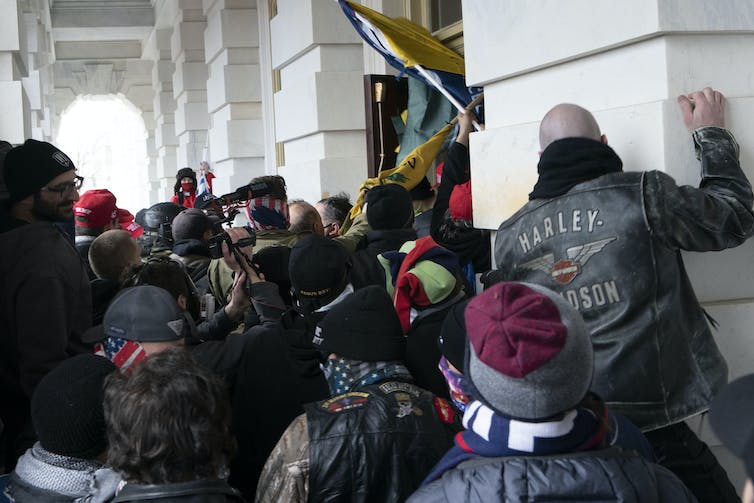Brazil, US show that secure elections require agreement – not just cybersecurity and clear ballot records

Protesters who support Brazil's former President Jair Bolsonaro storm the National Congress building in Brasilia, Brazil, on Jan. 8, 2023. AP Photo/Eraldo Peres
There are a number of ways to run a legitimate election. But the U.S. has learned in recent years, and Brazil learned in recent weeks, that it’s not always simple.
There are technical mechanics and processes of how votes are cast, collected and counted. But those are ultimately less important than the agreement – among opposing parties, and across a society – to abide by the results of those processes.
In 2020, President Donald Trump alleged, without evidence, that election fraud in several states had caused him to lose. A number of audits in various states found no evidence that irregularities in voting or vote counting processes had any effect on the outcome of balloting in those states.
Some of these results were later challenged in lawsuits seeking to alter the results of the election, and in every case, the election’s outcome was determined to be accurate.
Though the vast majority of these questions and checks and court decisions concluded before Congress met to count Electoral College votes on Jan. 6, 2021, Donald Trump’s supporters and a number of militia groups stormed the U.S. Capitol in an attempt to stop the counting and have Trump declared president.
In Brazil in late 2022, incumbent president Jair Bolsonaro lost an election to Luiz Inácio Lula da Silva, a former president seeking a return to office. Even before the election, Bolsonaro had cast doubt on the integrity of the country’s voting system. On Jan. 8, 2023, after Lula had been in office for a week, thousands of Bolsonaro supporters, including right-wing militants, attacked key government buildings, including the building that houses the national Congress.
As a scholar who studies election integrity and cybersecurity, I see the source of these violent disputes not as the result of procedural or technical flaws in the voting system but rather as a failure of certain individuals living in democratic society to uphold the fundamental principles of democracy.
A set of principles
I and others in my field tend to agree, and think most regular people would too, that election officials should aspire to the following basic criteria:
Every person with a legal right to vote is able to cast a ballot in a given election.
No person without a legal right to vote is able to cast a ballot.
No person is allowed to cast more than one ballot.
Every ballot unambiguously indicates the voter’s preference.
Every ballot cast by a legally legitimate voter is counted, but no other ballots are counted.
No ballot cast can be associated with the voter who cast the ballot (that is, voters can maintain the secrecy of their ballots).

Protesters in Brazil storm the Planalto Palace, the official workplace of the nation’s president, on Jan. 8, 2023.
AP Photo/Eraldo Peres
To help uphold these standards, many election security analysts, including me, believe that paper records are an essential element of electronic voting systems. They leave open the possibility of recounting ballots in the event of a claim that electronic ballots were counted incorrectly. In general, only people who appear to have lost elections make these claims, though some states’ laws require automatic recounts when the margin of difference is small.
But Brazil has done away with paper voting entirely. The nation’s election officials take many measures to ensure that the electronic voting machines are working properly and are not tampered with, including testing a large sampling of the machines on Election Day, obtaining third-party analysis of at least parts of their software, and ensuring they are not connected to the internet, to increase their protection from hackers.
But no combination of these measures, nor any of the other protections, such as public posting of vote tallies and requiring voters to use fingerprints to unlock voting machines or to present photo identification to poll workers, is completely foolproof.
Paper ballots aren’t foolproof, either: Fraudulent ballots could potentially be manufactured and inserted into the counting process without being detected. Ballots can be irretrievably destroyed after being cast. Improperly made marks on a ballot may not clearly indicate the voter’s intent. Humans engaged in the mind-numbing effort of counting thousands of ballots get tired and make mistakes. Counting paper ballots takes considerable time that disgruntled parties can use to sow unfounded doubts about election integrity.
Intelligently designed paper-based voting systems take measures to ameliorate all of these problems. But just as in the case of electronic voting, it is ultimately a matter of human judgment about whether those protections result in an acceptable level of security. And guaranteeing 100% security in an election is essentially impossible.

Supporters of President Donald Trump storm the U.S. Capitol on Jan. 6, 2021.
AP Photo/Jose Luis Magana
Elections are necessary
Despite the inevitable flaws in voting and counting, democracies need to conduct elections. They must choose election officials for whom the public’s confidence in the security of the elections is more important than any partisan outcome.
Another key element of election integrity comes from the candidates. It’s important to public confidence in elections that candidates be willing to express their own support for the voting system, including whatever measures are set up for integrity and recounting, even if that system delivers them a loss.
The basic proposition of democracy is that all candidates agree to a particular process, election managers do their best to ensure that process unfolds fairly, and everyone abides by whatever the results are, no matter who winds up losing.
Without mutual agreement on process, it is impossible to have an uncontested election, because a candidate who doesn’t like the outcome can always claim – even without evidence – that it was somehow unfair.
True democracies require candidates who agree on election rules and processes in advance and agree to abide by the outcome of elections, even when they wish the results were otherwise. The alternative is continuing instability and doubt in the electorate – an outcome that serves no citizen’s interests.
![]()
Herbert Lin has received funding indirectly from the Hewlett Foundation through Stanford University. He is a registered Republican but who he supports is a different matter.






